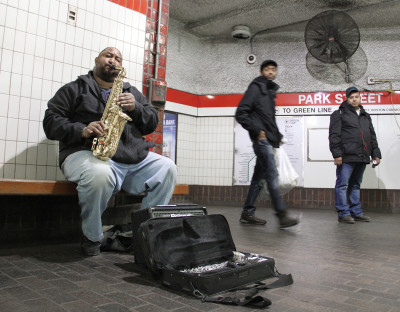 Sidewalk artists may be required to have permits to perform in public areas as result of a Boston City Council ordinance introduced at a Wednesday meeting.
Sidewalk artists may be required to have permits to perform in public areas as result of a Boston City Council ordinance introduced at a Wednesday meeting.
The ordinance defines a performer as any person who acts, sings, plays a musical instrument, pantomimes, juggles, dances, recites or does puppetry.
Salvatore LaMattina, one of the councilors supporting the ordinance, said he wrote it to protect both street performers and residents from feeling uncomfortable and unsafe in Boston.
“The purpose of this ordinance is to have reasonable regulation for street performers in the City of Boston in order to ensure access to public areas for all,” LaMattina said. “ … This ordinance is designed to help street performers in working with the city to share spaces and to abide by the rules involving noise, pedestrian access and solicitation.”
The growing number of complaints that he has received over the years has been the stimulus for creating this ordinance, LaMattina said, because many residents have felt threatened and harassed from performances, especially in the Faneuil Hall area.
“This proposal is not anti-street performers,” LaMattina said. “It is rather to help street performers from being bullied as well as residents [from] being solicited.”
The ordinance also details restrictions on the locations of where street performers can perform. Schools, churches and hospitals are some of the areas that are off limits to street performers.
To obtain a permit, street performers have to submit an application and pay $40. The ordinance will require also that each member of a group of performers must obtain a permit, but no group of street performers, if noted in their applications, will be charged more than $160. These permits are valid from the date of purchase until the end of the calendar year.
Additionally, the Commissioner of Public Works will be able to further regulate which locations and at what times street performers are allowed to perform, the ordinance states. Punishment for not cooperating with the ordinance can be suspension of permits.
Stephen Baird, executive director of the Street Arts and Buskers Advocates, said he strongly disagreed with the new ordinance and felt that it is simply unconstitutional.
“It’s a real mistake by the city because artists keep the city alive and new art forms like jazz, blues and tap dancing were not invented in the university but on the streets by people,” Baird said.
Not only is the content alarming, Baird said, but also the language of the ordinance is problematic.
“It’s so poorly written that it doesn’t define anything and it doesn’t say what time you can play,” Baird said. “It just says who the department of Public Works will determine, [and] what time people can play. That’s totally discretionary and unconstitutional.”
Baird warned of future court action if this ordinance continues.
“I’ve already sued the city twice in federal court,” Baird said. “If they pass it, we will go a third time and we will seek financial damages from the city for the abuse.”
Juan Lopez, 52, of Jamaica Plain, who works with City Council himself, found the ordinance to be reasonable.
“I understand when you have a number of people and they want to actually perform or use a public way as a stage for their art and for their expression that their might be a need to keep track of that and so on,” Lopez said. “The thing is there are certain things that need a balance. You have some street performers that may go into a particular area and then depending on what they’re doing [it] might be a performance to them but could be offensive or loud to other[s].”
However, other residents feel that street performers are central to the culture of Boston and that this does pose a barrier to them.
Noel Hong, 22, of Jamaica Plain, said he does not find street performers to be especially intrusive and says that the fee may cause a hindrance to performers who are an important part of the city.
“It may not be fair for people who obviously can’t afford it and that’s their job,” he said.
Andrew Fitch, 30, of Beacon Hill, agreed that street performers have become an integral part of the city of Boston.
“It’s part of the culture to have people like that around,” Fitch said. “It adds to the urban fabric.”






















































































































